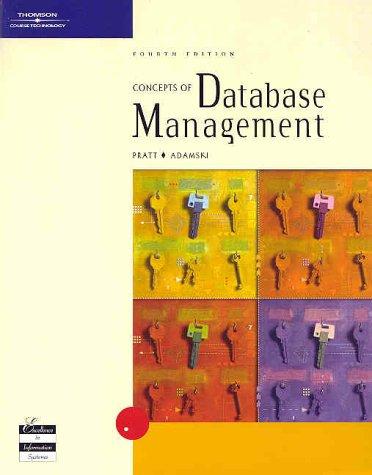Question
Against the advice of everyone you know, you decide to open up a DVD rental store! Requirements: To run a successful store you must: Store
Against the advice of everyone you know, you decide to open up a DVD rental store!
Requirements:
To run a successful store you must:
Store information about your Customers.
Store information about your available Movies.
Maintain a mapping of which movies each customer currently is renting.
Step 1: Your Customer class.
Create a Customer class that stores a Customer ID, First Name, Last Name, and Account Balance.
Override toString(), equals(), and hashCode() as discussed in class. Customer ID is sufficient to uniquely identify a Customer.
Create all constructors, getters, setters as necessary
Step 2: Your Movie class
Create a Movie class that stores a Movie Title and Copies Remaining
Override toString(), equals(), and hashCode() as discussed in class. Movie Title is sufficient to uniquely identify a Movie.
Create all constructors, getters, setters as necessary
Step 3: Your Video Store class
This class is central to your application. Create a VideoStore class that contains your Store Name, as well as:
A Set containing your movies
A Set containing your customers
A Map specifying which customers have rented which movies
Create the following methods in your VideoStore class:
- addMovie() : Adds a movie to your available titles. It should take the movie title and number of available copies as parameters.
- updateMovie() : Updates a movie in your system. It should take the movie title and number of available copies as parameters.
- addCustomer() : Adds a customer to your system. It should take the customers Customer ID, First Name, Last Name, and Account Balance as parameters.
- updateCustomer() : Updates a customer to your system. It should take the customers Customer ID, First Name, Last Name, and Account Balance as parameters.
- addRental(): Records the fact that a customer has rented a movie. It should take the Customer ID and the movie title they would like to rent as parameters. It should verify that the movie is available (in the system, and having number of copies > 0), and that the customer is in the system. If these verifications pass, it should record the fact that the movie has been rented in the Map, decrement the number of copies of that movie are available, and return true. If these verifications fail, it should provide a useful message and return false.
- showAll(): Displays all Movies, Customers, and Rentals in a nicely formatted manner using Iterators as described in class.
Step 4: Your main() method
In your main method:
Create an instance of your VideoStore class.
Use the addMovie() method to add 3 movies to the system
Use the updateMovie() method to update a movie to the system
Use the addCustomer() method to add 2 customers to the system
Use the updateCustomer() method to update a customer to the system
Use the addRental() method to make a single customer rent at least two different movies
Use the showAll() method to show the status of your video store
Step 5: Create a UML Class diagram for all of your classes.
Step by Step Solution
There are 3 Steps involved in it
Step: 1

Get Instant Access to Expert-Tailored Solutions
See step-by-step solutions with expert insights and AI powered tools for academic success
Step: 2

Step: 3

Ace Your Homework with AI
Get the answers you need in no time with our AI-driven, step-by-step assistance
Get Started


